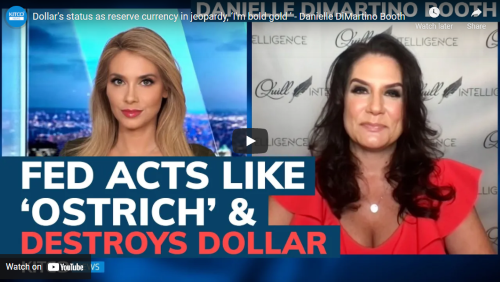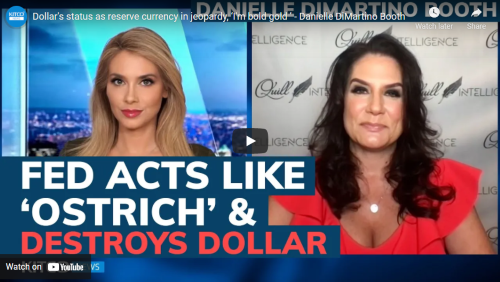


By Kitco News
Even in light of a clearly recovering economy, and new COVID cases on the decline, the government continues to inject liquidity into the financial system through fiscal and monetary stimulus, with the end result being the devaluation of the dollar and losing its global reserve currency status to China, said Danielle DiMartino Booth, CEO of Quill Intelligence.
“We are no longer in an emergency situation. If the Fed is going to insist on being an ostrich and sticking its head in the sand, while it's pumping out $120 billion per month of quantitative easing as if we were in a depression, then yes, I see every reason for China to continue playing its very game with the intention of eventually unseating the U.S. dollar,” DiMartino booth told Michelle Makori, editor-in-chief of Kitco News.
Even if the Federal Reserve wanted to turn things around for the dollar, it would not be in a position to do so, Booth said.
“If the Fed was to try and normalize policy and the stock market were to take a really big downturn, then you would see that ripple through the economy and we would be back in recession,” she said. “The magnitude of the Fed’s intervention in this particular episode has put an entire economic recovery inside of a time compression chamber.”
The labor market, automobile, and other consumer discretionary sectors have all rebounded as a result of fiscal stimulus, facilitated by the central bank, she said, but the Fed has gone on a ‘bridge too far’ and needs to step back and regain its independence from the Treasury.
Booth emphasized that should the dollar lose its crown as the world’s defacto reserve currency, the mantle would be taken up by the Chinese yuan.
“I can’t see [the dollar] being replaced by anything else but the Yuan, which would explain why [China] is trying, as aggressively and as rapidly as they are,” she said. “I’m not of the opinion that it’s going to be a cryptocurrency.”
On the fiscal stimulus front, Booth said that stimulus checks are not encouraging people to return to work, hence the lower-than-expected nonfarm payroll report in April; the U.S. added only 266,000 jobs last month, well below the 1 million expected by economists.
On the contrary, stimulus checks are indirectly hurting small businesses, Booth said.
To find out how stimulus is harming private enterprises in America, as well as why investors should hold precious metals, watch the video above.
Disclaimer: This article is provided for informational purposes only. It is not offered or intended to be used as legal, tax, investment, financial, or other advice.
The original article was written and published on Kitco News
